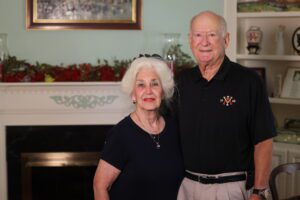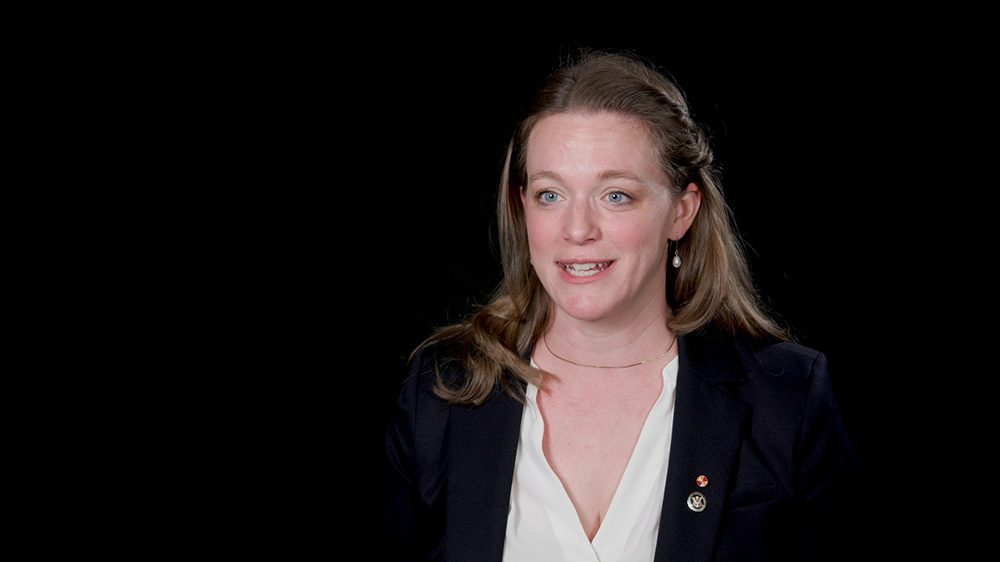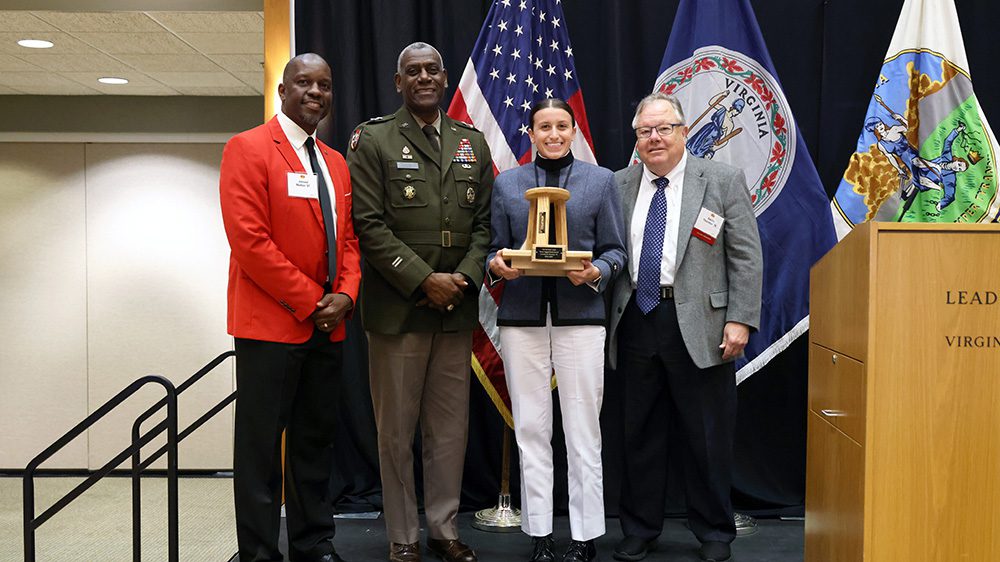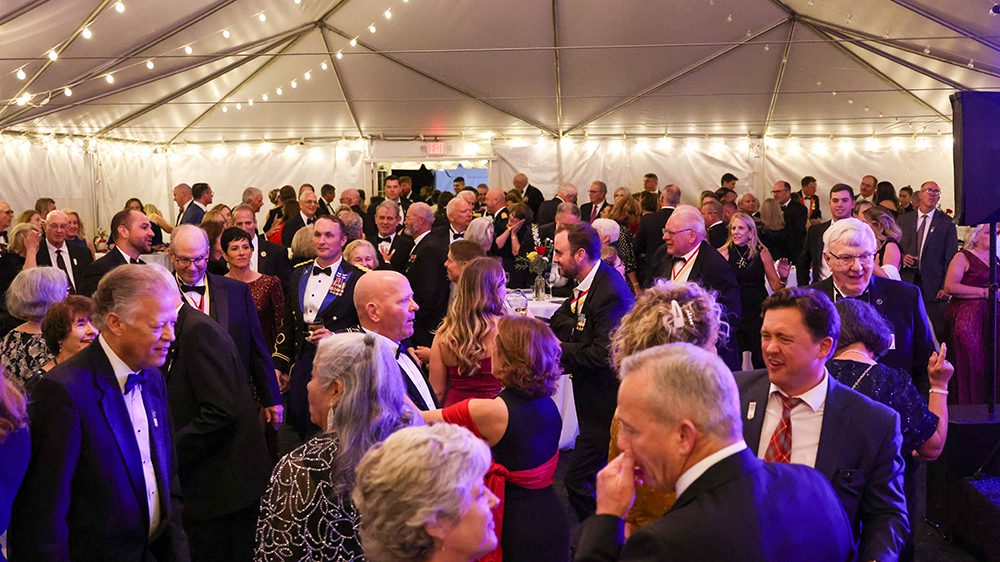Over the years, retired U.S. Army Col. Stephen E. “Steve” Wilson ’68 has been involved with VMI in a variety of capacities. He’s a former faculty member, having served as the professor of military science in VMI’s Army ROTC unit from 1993–95 and even taken a turn as acting commandant, in addition to being a former president of the Rappahannock Chapter. But perhaps the designation he’s proudest of is being a member of the Washington Arch Society—a group of individuals who have included VMI in their estate plans.
Wilson and his wife, Linda, have created a living trust, which means that after they have both died and their estates have been settled, their remaining assets will go to VMI.
“It’s just the idea that VMI and what it offers to its alumni—its cadets, and its alumni, and to this state and nation— it’s important that it be resourced so it can continue its mission,” said Wilson, now retired and living in Williamsburg, Virginia.
Wilson’s path to the Institute began when he was attending a Catholic high school in Rome, Italy, while his father was stationed overseas. “It was almost like a military school in terms of rigorous academics, discipline, and a great honor system,” recalled Wilson.
Wilson’s family returned to the United States in time for him to finish high school in Prince George, Virginia. By the time graduation rolled around, the Vietnam War was escalating, and Wilson knew that a military college would be a wise choice.
Having never visited VMI, Wilson entered the Institute as an electrical engineering major. The Rat Line tried him, as it does all cadets, but for Wilson, academics were even more of a trial, and by the time he finished his rat year, he was on academic probation.
“I transferred to history, and it made all the difference in the world,” he stated. By graduation, Wilson’s GPA had risen to the point where he graduated ranked midway among history majors.
Like many of his brother rats, Wilson commissioned into the Army at graduation and was sent to Vietnam. There, he found that the mental attitude he’d adopted at VMI would serve him just as well in Southeast Asia: “Since I’m here, I’m going to make it through.”
Wilson’s Army career eventually took him all the way to two big assignments. “I served as the armor branch chief in the Total Army Personnel Command, and I was responsible for the assignments and professional development of all armor officers [from] second lieutenant through lieutenant colonel,” he commented. “That could be interesting.”
His next assignment was serving as the chief of the Army’s current operations division in the Pentagon and running the daytime crisis action team for the Army, a task that Wilson described as “really high pressure.”
But as any VMI alumnus would, Wilson kept his cool when the chips were down. “Irrespective of the pressure, I was able to keep a calm demeanor, encourage my officers to go for the task at hand, and we’ll take care of you,” he stated.
“VMI provided a basic foundation because you were tested and tried early,” he explained. “And if you got through that, anything else is kind of like an example. I had a rocky beginning academically. Every school that I’ve attended since VMI … I’ve been either on the commandant’s list or the honor roll.”
During his years back on post, Wilson experienced the fulfillment of giving back to a place that had given him so much. “I reported in [to VMI Army ROTC] and just ended up loving it,” he said. “I could relate to the cadets. … Since then, I’ve had some of my former cadets come up and say they really appreciated my mentoring them. It was all because I’d already been through the crucible.”
Near the end of Wilson’s first year on post, he was asked to serve as acting commandant when retired U.S. Army Brig. Gen. Mike Bissell ’61, then commandant, had to take a medical leave.

From their belief in VMI and its mission, Wilson and his wife, Linda, created a living trust, meaning that after they have both died and their estates have been settled, their remaining assets will go to VMI.
“That gave me an appreciation for what the commandant did when I was there,” Wilson noted. As the professor of military science, Wilson was also a member of the Institute’s Academic Board, which further broadened his perspective.
Wilson left VMI in summer 1995 due to his wife’s employment in Fairfax County and his reassignment as deputy commander of the U.S. Army Center of Military History, but his interest in supporting VMI never waned. After retirement, he and Linda relocated to Mathews, Virginia, and it was there that he became involved with the Rappahannock Chapter, serving as its president for five years. Since 2016, he’s served as the VMI Alumni Association’s liaison to the VMI Board of Visitors’ cadet and military affairs committee.
“So, the beauty of that is with that assignment, I can leverage my experience not only in the Army but my experience at VMI, both as the commandant and as [professor of military science],” he commented.
Being on this committee has helped Wilson see that today’s cadets have opportunities that cadets of his generation did not.
As a former cadet who experienced academic challenges himself, Wilson is keenly aware that private support is essential to providing academic support services such as the Miller Academic Center, the Writing Center, and the Mathematics Education Resource Center.
“The contributions help these vital organizations help a cadet,” he noted. “All I can say is that I wish we had something like that when I was a cadet.”
Wilson has also seen that while there have been changes at VMI over the decades, what he calls the “bedrock”—a commitment to honor as the most fundamental value—remains unchanged. “Educating youngsters in a framework of honor is all-important,” he said.
“[VMI is] also setting a framework of being able to deal with all the difficulties and challenges of life. Because if you can address the challenges of VMI and survive, everything else, in some respects, is almost no biggie.”
Like many alumni, Wilson found the occasion of his 50th Reunion an especially meaningful time of appreciation and reflection. As an expression of gratitude, he decided to establish a scholarship, and when he wrote the check, he got a big surprise.
“I’m handing over the check; serendipitous as it was, the check number was 1968,” he noted.
Soon thereafter, the Wilsons decided to establish a trust. “I know … how important it is that the Foundation can continue to support all the programs necessary not just for staff and faculty, but for cadets,” he stated. “And for basic operations … just for funding chairs, academic chairs, all that’s important.”
With no children, Wilson takes a broad perspective toward younger generations: “In some regard, I look at some of the former cadets as my children.”
And when he thinks about the day he and Linda signed the paperwork making the gift official, a sense of peace and certainty prevails: “I’m glad we were able to do this.”






